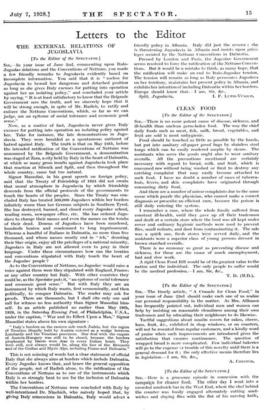Letters to the Editor
THE EXTERNAL RELATIONS OF JUGOSLAVIA [To the Editor of the SPECTATOR.]
Sta,—In your issue of June 2nd, commenting upon Italo- Jugoslav relations and the Conventions of Nettuno, you made a few friendly remarks to Jugoslavia evidently based on incomplete information. You said that it is " useless for Jugoslavia to bewail her dangerous and detached position so long as she gives Italy excuses for putting into operation against her an isolating policy," and concluded your article by saying, " It is at least satisfactory to know that the Belgrade Government sees the truth, and we sincerely hope that it will be strong enough, in spite of Mr. Radich, to ratify and enforce the Nettuno Conventions, which, so far as we can judge, are an epitome of social tolerance and economic good sense."
Now, as a matter of fact, Jugoslavia never gives Italy excuses for putting into operation an isolating policy against her. Take for instance, the late demonstrations in Jugo- slavia. They were heralded as a spontaneous outburst of hatred against Italy. The truth is that on May 24th, before the intended ratification of the Conventions of Nettuno was announced by the Belgrade Government, a demonstration Was staged at Zara, a city held by Italy in the heart of Dalmatia, at which so many gross insults against Jugoslavia took place that reaction at Sibenik and Split, and then throughout the whole country, came but too natural.
Signor Mussolini, in his great speech on foreign policy, said that the Treaty of Friendship of 1924 did not create that moral atmosphere in Jugoslavia by which friendship descends from the official protocols of the governments to touch the hearts of the peoples. Since the Treaty was con- cluded Italy has treated 500,000 Jugoslays within her borders infinitely worse than her German subjects in Southern Tyrol. She has destroyed, burned, and closed every Jugoslav school, reading room, newspaper office, etc. She has ordered Jugo- slays to change their names and even the names on the tombs of their dead. Dozens of Jugoslays have been murdered, hundreds beaten and condemned to long imprisonment. Whereas a handful of Italians in Dalmatia, no more than five thousand, and whose names mostly end in " ich," denoting their Slav origin, enjoy all the privileges of a national minority, Jugoslays in Italy are not allowed even to pray in their language. Under these circumstances how can the treaties and conventions stipulated with Italy touch the heart of the Jugoslav people ?
As to the Conventions of Nettuno, no Jugoslav would raise a voice against them were they stipulated with England, France, or any other country but Italy. With other countries they could be, as the Spectator puts it, " an epitome of social tolerance and economic good sense." But with Italy they are an instrument by which Italy wants, first economically, and then politically, to conquer Dalmatia. The reader may ask for proofs. There are thousands, but I shall cite only one and call for witness no less authority than Signor Mussolini him- self. In an article published no earlier than May 19th, 1928, in the Saturday Evening Post, of Philadelphia, U.S.A., under the caption, " War and its Effect Upon a Man," Signor Mussolini states above his own signature :
" Italy's borders on the eastern side reach Judrio, but the region of Trentino illegally held by Austria entered as a wedge between Lombardy and the Venetian provinces. Our deal with the empire of Austria-Hungary was still to be closed, because the borders prophesied by Dante were dear to every Italian heart. They were still, and always would be, along the line of the Brennero and of the Giulian and 111yric Alps, including Fiume and Dalmatia."
This is not mincing of words but a clear statement of official Italy that she always aims at borders which include Dalmatia. Every Jugoslav knows that, and hence the general opposition of the people, not of Radieh alone, to the ratification of the conventions of Nettuno as to one of the instruments which Italy is so strongly bent to use for the inclusion of Dalmatia Within her borders.
The Conientions of Nettuno were concluded with Italy by well-intentioned Dr. Ninchieh, who naively hoped that, by giVing Italy cOneessions in Dalmatia, Italy would adopt a friendly policy in Albania. Italy did just the reverse ; she is threatening Jugoslavia in Albania and insists upon privi- leges secured by the Nettuno Conventions in Dalmatia.
Pressed by London and Paris, the Jugoslav Government seems resolved to force the ratification of the Nettuno Conven- tions. But it would be a mistake to think, as many hope, that the ratification will make an end to Italo-Jugoslav tension. The tension will remain as long as Italy persecutes Jugoslays on her territory, maintains her present policy in Albania, and exhibits her intention of including Dalmatia within her borders. Europe should know that.—I am, Sir, &c.,












































 Previous page
Previous page